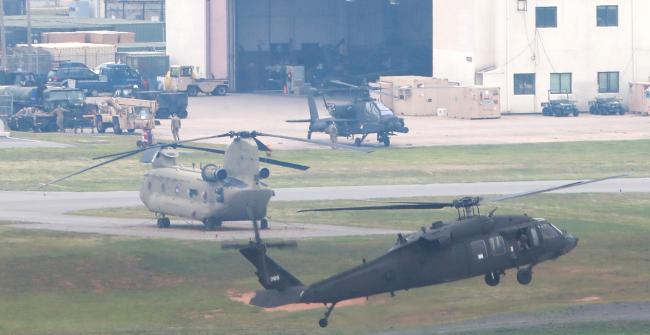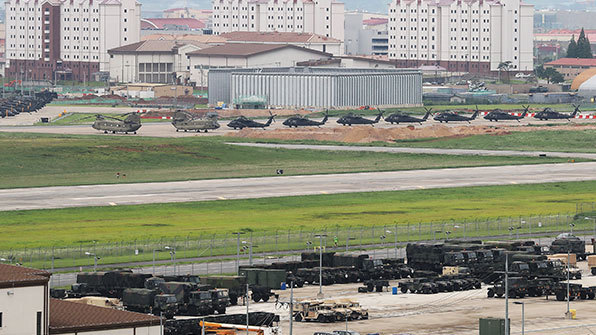NK’s progress on denuclearization pivotal to whether joint military drills remain suspended
By Yeo Jun-sukPublished : June 19, 2018 - 15:58
With South Korea and the United States declaring the halt of their joint military exercise scheduled for August, debate has emerged over the decision’s impact on the nuclear negotiation with North Korea.
The Ministry of National Defense and Pentagon announced Tuesday that they suspended “all planning” for the Freedom Guardian exercise following US President Donald Trump’s pledge to end “expensive and provocative” war games.
While Trump’s announcement took South Korea by surprise and sparked concern over the country’s readiness posture, analysts noted that the suspension of the drills could serve as a practical incentive to facilitate Pyongyang’s denuclearization efforts.
“Suspending the drills would be the most viable and corresponding measure in return for North Korea’s steps for denuclearization,” said Cho Seong-ryoul, a senior researcher at the Institute for National Security Strategy and member of the advisory group for President Moon Jae-in.
“I don’t think it is a huge concession for the US to make. The US should give something to North Korea in return when they suspend missile and nuclear tests and dismantle a nuclear test site,” Cho added.
The Ministry of National Defense and Pentagon announced Tuesday that they suspended “all planning” for the Freedom Guardian exercise following US President Donald Trump’s pledge to end “expensive and provocative” war games.
While Trump’s announcement took South Korea by surprise and sparked concern over the country’s readiness posture, analysts noted that the suspension of the drills could serve as a practical incentive to facilitate Pyongyang’s denuclearization efforts.
“Suspending the drills would be the most viable and corresponding measure in return for North Korea’s steps for denuclearization,” said Cho Seong-ryoul, a senior researcher at the Institute for National Security Strategy and member of the advisory group for President Moon Jae-in.
“I don’t think it is a huge concession for the US to make. The US should give something to North Korea in return when they suspend missile and nuclear tests and dismantle a nuclear test site,” Cho added.

After holding a historic summit in Singapore with North Korea’s leader Kim Jong-un on June 12, Trump told reporters that he would suspend joint war games with North Korea for as long as Pyongyang engages in denuclearization talks “in good faith.”
Cheong Wa Dae spokesperson Kim Eui-kyeom said Tuesday that the suspension of the exercises came in return for North Korea’s “practical and pre-emptive” measures for denuclearization, such as the country’s decision to shut down its only known nuclear test site in Punggyeri last month.
The spokesperson added that the suspension would be in effect on the condition that North Korea meets two requirements: keeping the momentum for dialogue and showing progress on denuclearization.
“I’d like to say that the military exercises remain suspended for as long as North Korea shows implementation of denuclearization measures and the dialogue continues. If it meets the two requirements, the exercise will remain suspended,” Kim told reporters during a regular briefing.
It is not the first time that the allies’ joint military drills are being suspended. Depending upon Washington’s strategic calculations and inter-Korean relations, the allies have adjusted -- and even canceled -- joint military drills.
In 1990 when the US participated in the Gulf War, the allies decided to halt the joint exercise called Team Spirit -- precursor to the Ulchi Freedom Guardian. The drill was also suspended in 1992 when North Korea accepted international verification of its nuclear programs.
The exercise resumed in 1993, however, when North Korea rejected enhanced inspection of its plutonium production and withdrew from the Nonproliferation Treaty. Since then, the large-scale exercises have been held regularly on a near semiannual basis.
“The beauty of suspending the joint military drills is that it’s a snapback measure subject to North Korea’s denuclearization. If we think that Pyongyang falls short of meeting our expectation, we can resume the exercises whenever possible,” said Cho of the Institute for National Security Strategy.

Suspending joint drills is often viewed as diplomatic leverage to assuage North Korea’s national security concerns in return for abandoning its nuclear program. North Korea has accused the joint drills of being a dress rehearsal for invasion even though the allies’ insisted that it was defensive in nature.
While the suspension holds the possibility of creating momentum for further denuclearization talks, concern persists over the move as Trump appeared to reach such a deal with Kim without proper consideration of US allies.
Fueling the worries is that the idea of canceling the exercise might have come from China, who proposed what it calls a dual suspension, whereby South Korea and the United States suspend military exercises in return for North Korea’s moratorium on nuclear and missile tests.
“We can make some sacrifice on the joint military exercise, if the measure leads North Korea to make a breakthrough on denuclearization,” said Kim Hyun-wook, a professor at the National Korea Diplomatic Academy.
“But we have to be cautious about whether it was North Korea’s agenda or China’s agenda. If it proves to be the Chinese one, it could be a signal that China wants to expand its influence on the Korean Peninsula through denuclearization talks.”
North Korea and the US have offered different accounts about which party was the first to propose the idea of suspending the joint military exercise. There was even a Japanese report that Chinese leader Xi Jinping asked North Korea’s leader Kim to deliver the proposal to Trump.
But analysts downplayed the possibility that China had pulled strings, stressing that Pyongyang wants to take the lead in denuclearization talks by announcing unilateral measures, such as the shutdown of its Punggye-ri nuclear site.
“It’s just a myth that the North Koreans can be swayed by the Chinese,” said Kim Dong-yup, a professor at Kyungnam University’s Far East Institute. “It seems that North Korea has been pre-emptive and proactive in announcing its own measures for denuclearization,”
By Yeo Jun-suk (jasonyeo@heraldcorp.com)
While the suspension holds the possibility of creating momentum for further denuclearization talks, concern persists over the move as Trump appeared to reach such a deal with Kim without proper consideration of US allies.
Fueling the worries is that the idea of canceling the exercise might have come from China, who proposed what it calls a dual suspension, whereby South Korea and the United States suspend military exercises in return for North Korea’s moratorium on nuclear and missile tests.
“We can make some sacrifice on the joint military exercise, if the measure leads North Korea to make a breakthrough on denuclearization,” said Kim Hyun-wook, a professor at the National Korea Diplomatic Academy.
“But we have to be cautious about whether it was North Korea’s agenda or China’s agenda. If it proves to be the Chinese one, it could be a signal that China wants to expand its influence on the Korean Peninsula through denuclearization talks.”
North Korea and the US have offered different accounts about which party was the first to propose the idea of suspending the joint military exercise. There was even a Japanese report that Chinese leader Xi Jinping asked North Korea’s leader Kim to deliver the proposal to Trump.
But analysts downplayed the possibility that China had pulled strings, stressing that Pyongyang wants to take the lead in denuclearization talks by announcing unilateral measures, such as the shutdown of its Punggye-ri nuclear site.
“It’s just a myth that the North Koreans can be swayed by the Chinese,” said Kim Dong-yup, a professor at Kyungnam University’s Far East Institute. “It seems that North Korea has been pre-emptive and proactive in announcing its own measures for denuclearization,”
By Yeo Jun-suk (jasonyeo@heraldcorp.com)




![[KH Explains] No more 'Michael' at Kakao Games](http://res.heraldm.com/phpwas/restmb_idxmake.php?idx=644&simg=/content/image/2024/04/28/20240428050183_0.jpg&u=20240428180321)












![[Herald Interview] Mistakes turn into blessings in street performance, director says](http://res.heraldm.com/phpwas/restmb_idxmake.php?idx=652&simg=/content/image/2024/04/28/20240428050150_0.jpg&u=20240428174656)
